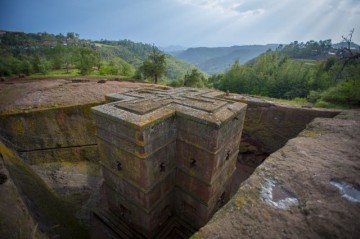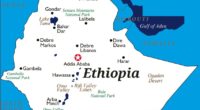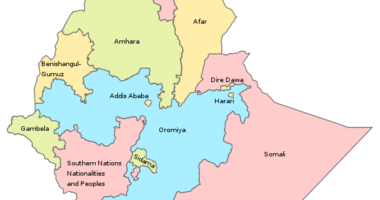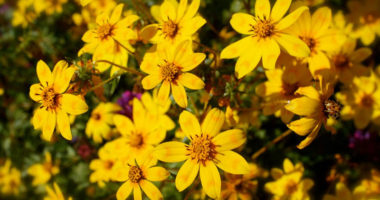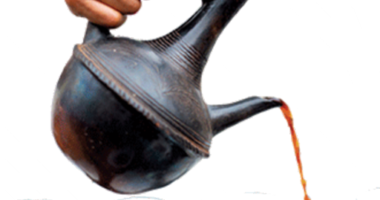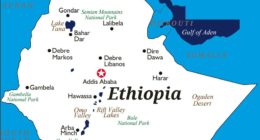Ethiopia, the origin of humankind; home of the earliest remains of human ancestors ever, the origin or birthplace of the wild coffee plant, ‘Arabica’, Ethiopia’s gift to the world. Ethiopia is also the source of the Blue Nile, the great river whose power and fertility nurtured the origin of civilization itself.
Ethiopia as a country is believed to be the origin of so much more. Wel-come to Ethiopia, many reasons to Smile!
Ethiopia is a country like nowhere else on the planet. Africa’s fastest growing economy is a land of contrast, at once modern and traditional, with a highly diverse population united by a unique history. The landscape of Ethiopia is no less varied with lakes, rivers, Rocky Mountains, grasslands, and lowlands.
Top it off with incredible wildlife, remarkable culture and peoples, delicious food, pleasant weather and nine UNESCO World Heritage sites (the highest number in Africa), and you obtain a great holiday destination, the perfect balance between a backpackers’ holiday and a cultural trip for history buffs.
History and Culture
As the only African country to have escaped European colonialism, Ethiopia has retained much of its cultural identity. Its fascinating and enigmatic recorded history stretches back 3,000 years to the reign of the Queen of Sheba and King Solomon. The country is a cradle of prehistoric humankind and embraced Christianity long before the missionaries arrived. Ethiopia’s ancient orthodox Christianity has endowed the nation with thousands of churches and monasteries, while a succession of empires and kingdoms added medieval forts, palaces, and tombs through the centuries.
Culturally speaking, Ethiopia is home to the ancient city of Harar (the world’s fourth holiest Islamic city), the medieval rock-hewn churches of Lalibela and Gheralta, and the magnificent 17th-century castles of Gondar, that is often called the ‘Camelot of Africa’ on account of its splendid collection of turreted castles.
Vibrant lifestyle
The Ethiopian lifestyle, with its unique musical and linguis- tic heritage and cuisine, combined with an ancient coffee culture and a thriving artisanal scene, makes the country an unmissable stopover for culture-hungry visitors. When it comes to human cultures, Ethiopia has an embarrassment of riches. The country’s population is highly diverse, comprising over 80 different ethnic groups. In addition to the Oromo, Amhara, Somali, and Tigrayans, who together constitute around three-quarters of the population, smaller groups like the Surmi, Afar, Mursi, Karo, Hamer, Nuer, and Anuak also live in the country. Their ancient customs and traditions have remained almost entirely intact. Venturing into these communities and staying among them is akin to receiving a privileged initiation into a forgotten world.
Ethiopia produces food, music, and art that bear little resemblance to anywhere else in the world. Ethiopia’s unique cuisine – dominated by pancake-like injera, heaped with a tantalisingly spiced selection of vegan or meat dishes – will delight visitors with adventurous palates. A host of colourful and popular Christian and Islamic festivals occur along the year, including the Meskel Ceremony held in Addis Ababa or Aksum, and Timkat, best experienced in Gondar. Finally, Ethio- pia is also the birthplace of coffee, and its rich coffee culture is embodied in the aromatic and age-old ‘coffee ceremonies’ held daily all over the country.
Full of Sight
With its spectacular scenery, rich biodiversity, and numerous protected areas, Ethiopia is a paradise for nature lovers with landscapes epic in both scale and beauty. Ethiopia is a land where one can trek more than 3,000 meters above sea level (in the Simien and Bale mountains) or visit the lowest place on the African continent, the Danakil Depression (125 meters below sea level), the lowest point in Africa and second in the world (after the Dead Sea). In between, there are lush highlands and stirring deserts, vertiginous canyons and sweeping savannah, vast lakes and high plateaus. Besides, Ethiopia is home to landmarks of great significance, from the source of the Blue Nile to the Simien National Park, where massive erosion over the years on the Ethiopian plateau has created one of the most spectacular landscapes in the world.
Ethiopia’s wildlife riches are also diverse. Although lions, elephants, giraffes, and other typical safari animals are present in Ethiopia, the country is mainly famous for its endogenous species such as the Ethiopian wolf (the rarest dog in the world) and the peaceful Gelada baboon, also called bleeding-heart monkey. Watching the horned and sure-footed Walia ibex (the only indigenous goat in Africa) cling to a rocky precipice is one of the great sights in nature. Watching the horned and sure-footed Walia ibex (the only indigenous goat in Africa) clinging to a rocky precipice is just incredible. There are also many kinds of delightful birds to behold.
Climate
Despite its proximity to the Equator, Ethiopia’s high altitude ensures a temperate, moderate, even sometimes chilly climate – certainly not tropical. There are two rainy seasons: the irregular short rains from late January to early March, and long rains from June until mid-September. Ethiopia’s scenery is as diverse as its people and includes lakes, forests, savannah, depressions and deserts.
In elevation, it ranges from 120 metres below sea level in the harsh salt flats of the Danakil depression, to a 4624 metre peak in the Simien Mountains. Light summer clothes are suitable for daytime wear and a jacket or sweater is useful for the evening when the temperature is much cooler. Visitors to Ethiopia in the rainy season are reminded to pack suitable clothing if they intend to trek in the Simien or Bale mountains. Footwear for walking expeditions and visiting historic site should be light but strong. Sandals are not recommended.
